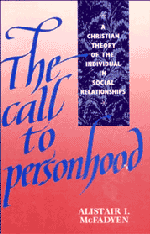Book contents
- Frontmatter
- Contents
- Acknowledgements
- Introduction
- Part I Persons in relation to God
- 1 The creation of individuality in God's image: Trinity, persons, gender and dialogue
- 2 The re-creation of individuality: the call of Christ
- Part II Social relations
- Part III Interpersonal relations
- Part IV Political relations
- Epilogue
- Notes
- Glossary
- Index
2 - The re-creation of individuality: the call of Christ
Published online by Cambridge University Press: 03 May 2011
- Frontmatter
- Contents
- Acknowledgements
- Introduction
- Part I Persons in relation to God
- 1 The creation of individuality in God's image: Trinity, persons, gender and dialogue
- 2 The re-creation of individuality: the call of Christ
- Part II Social relations
- Part III Interpersonal relations
- Part IV Political relations
- Epilogue
- Notes
- Glossary
- Index
Summary
Basic to the conceptuality I introduced in the first chapter is the understanding of human being in terms of response to God's address. God intends us as free dialogue-partners. Accepting this invitation means turning ourselves outwards towards God and echoing God's intention of ourselves, God and our relation. Our intentions in communication, the way we relate to ourselves and to God, and the form we expect ourselves and God to take in this relation then reflect or image the intentions and expectations God has. This happens when the prime informant of our communication and being is God's communication towards us and we respond to it in thanks and praise. This openness to God whereby we find our proper human identity by moving beyond ourselves is carried forward in our relationships with one another. In our social relationships, we become fully centred personal identities through moving beyond ourselves in dialogue with others. Living out the fullness of God's image involves relation in both dimensions.
However, even the corruption of the image, the turning away from God and the reality of others, is enabled by the divine intention of dialogue which requires and so creates the possibility of freedom in relation. So even the rejection of God reflects and images God's communicated intention, but it does so in a distorted way. In this sense, human being is always a response to God.
- Type
- Chapter
- Information
- The Call to PersonhoodA Christian Theory of the Individual in Social Relationships, pp. 45 - 66Publisher: Cambridge University PressPrint publication year: 1990

